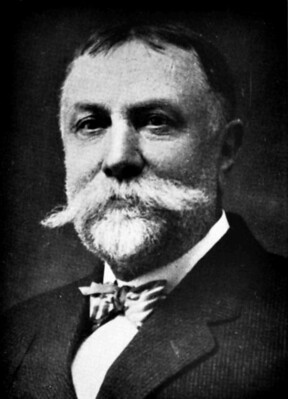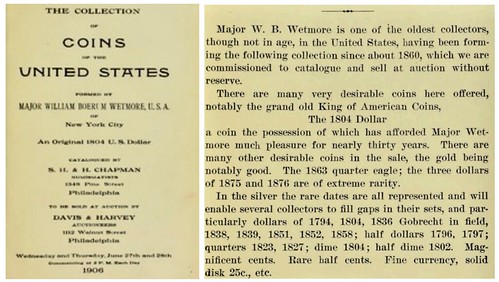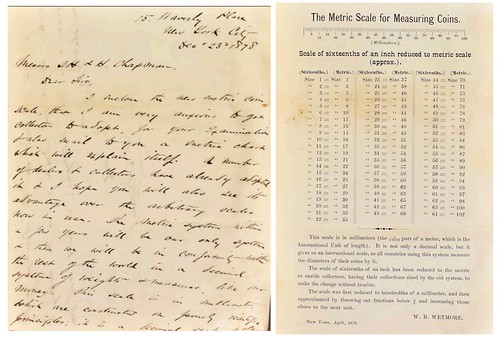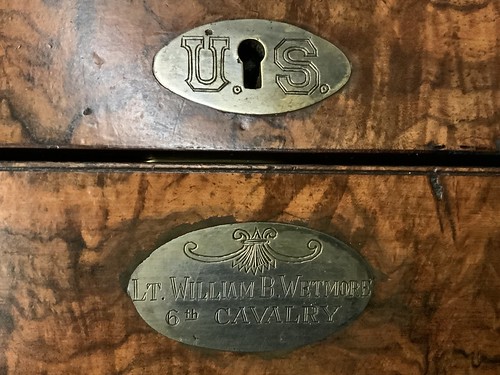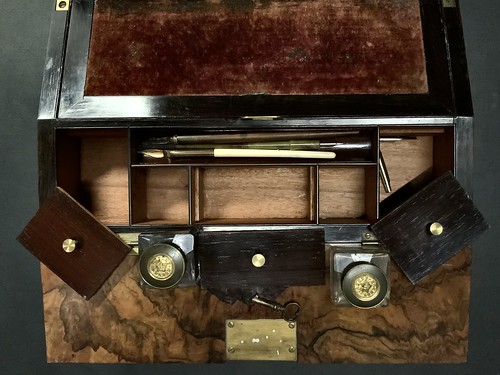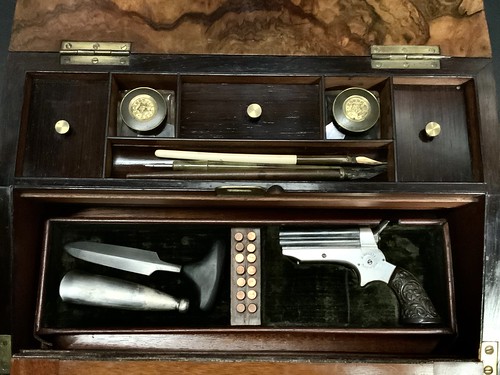
PREV ARTICLE
NEXT ARTICLE
FULL ISSUE
PREV FULL ISSUE
V25 2022 INDEX E-SYLUM ARCHIVE WILLIAM WETMORE'S TRAVELING DESKDave Fegley submitted these biographical notes on collector William Wetmore and photos of Wetmore's traveling desk, which Dave found recently at the antique arms show in Allentown PA. Cool item! -Editor
LT WILLIAM BOERUM WETMORE
6th CAV December 7, 1849 - March 24 1919
Cadet at West Point Military Academy, July 1, 1867, to June 14, 1872, when he graduated and was promoted in the Army to Second Lieutenant 6th Cavalry. He served at the Military Academy as Assistant Instructor of Ordnance and Gunnery, July 5-29, 1872, and of Field Telegraphing, July 29 to Aug. 31, 1872; on graduation leave of absence, Aug. 31 to Dec. 12, 1872; on frontier duty at Fort Reilly Kansas, Dec. 13, 1872, to Feb. 1, 1873,; Fort Wallace Kansas to July 10, 1873, — and at River Bend, Colorado to Oct. 3, 1873, being engaged on Sep. 10, 1873 in a hand-to-hand encounter with a band of desperadoes attempting to rob the Paymaster, he shot the chief of whom was the notorious ex Captain Graham; as Aide-de-camp to Bvt. Major-General Pope Oct. 3, 1873, to Sep. 4, 1875, at Headquarters of Fort Leavenworth Kansas as Acting Aide-de-Camp, Aug. 1 to Dec. 1, 1874, to Bvt. Major- General Miles, commanding Expedition to Indian Territory, being engaged, Aug. 30, 1874, in the Action of Red River, for which he was recommended to be brevetted First Lieutenant and Captain; on leave of absence, to make a tour around the world, Sep. 4, 1875, to Oct. 4, 1876. - Resigned, Dec. 1, 1876. Major, New York Militia, 1879-82. Delegate to Democratic Convention at St. Louis, Mo., to nominate a candidate for the Presidency, 1888. His marriage to Annette Butler in 1882 resulted in divorce and made the society papers in 1892 complete with allegations of gambling and other unpleasantness. His second marriage was to Katherine Havercamp. He raised in Philadelphia, Pa., and vicinity, the "Wetmore Regiment of Pennsylvania Volunteers," for the Spanish-American war, but finally had to disband it, as preference was given to the National Guard, who filled up the entire quota of the State. On the outbreak of the war with Spain, he offered his services to the government for any position to which they might choose to assign him. Friends wanted him to raise his regiment from Rhode Island and Fall River, but finding the State's quota full, he decided to raise one in Pennsylvania. He opened a recruiting office, all his men being physically examined, and had a regiment ready to go to the war, but unfortunately Pennsylvania's quota was at this time also full, and finding it impossible to get to the front, he got as many of his men as possible to join vacancies in other Pennsylvania regiments, even sending two companies to fill up one that was short. He then offered to take command of a battalion of troops in one regiment and put his men in, and it was accepted, but it was found the State's quota was full.
Throughout his life he was an avid coin collector and went on to
be a noted numismatist assembling one of the great collections
of early US coins and sold by S. H. & H. Chapman in 1906.
The catalog of his sale is reprinted to this day and included the
famous Some of his correspondence with S. H. Chapman is in the archive collection of the American Numismatic Society. He was friends with John Work Garrett who requested President Andrew Johnson recommend his admission to West Point. A December 23, 1878 letter from Major William Wetmore to S.H. Chapman from the ANS archives concerning the use of the metric system to measure coins. Retired Major Wetmore was a member of the U. S. Military Service Institute; U. S. Naval Institute; U. S. Cavalry Association; American Numismatic Society, New York; National Academy of Design, New York; American Geographical Society, N. Y.; Chamber of Commerce, N. Y.; American Metropolitan Museum of Art, New York; New England Society, New York; Order of the Cincinnati; Order of Society of War of 1812; Naval Order of United States; Order of Veterans of Indian Wars of the United States. - He died on March 24, 1919 in Atlantic City, New Jersey - Major William Boerum Wetmore 1870s traveling desk as found at antique arms show in Allentown, Pa. Believed to be a gift from his mother at his graduation from West Point in 1872. Dave adds: "It was a bit out of this poor guy's budget, but way too cool to leave to obscurity. I was about halfway home from that show when it struck me who (Major - not Lieutenant) Wetmore was. I turned around and drove 60 miles back to get it. "It really is beautiful even after 150 years. The (aged) owner had bought it at the Baltimore Antique Antique Arms Show in the early 80s. He didn't know who Wetmore was other than serving in the 6th Cav. This is the first it will be presented with proper identification." Thanks! Great association item. Wetmore's metric scale is akin to the Collet and Kolit scales discussed by Pete Smith last week. -Editor
To read the earlier E-Sylum article, see:
Wayne Homren, Editor The Numismatic Bibliomania Society is a non-profit organization promoting numismatic literature. See our web site at coinbooks.org. To submit items for publication in The E-Sylum, write to the Editor at this address: whomren@gmail.com To subscribe go to: https://my.binhost.com/lists/listinfo/esylum All Rights Reserved. NBS Home Page Contact the NBS webmaster 
|
